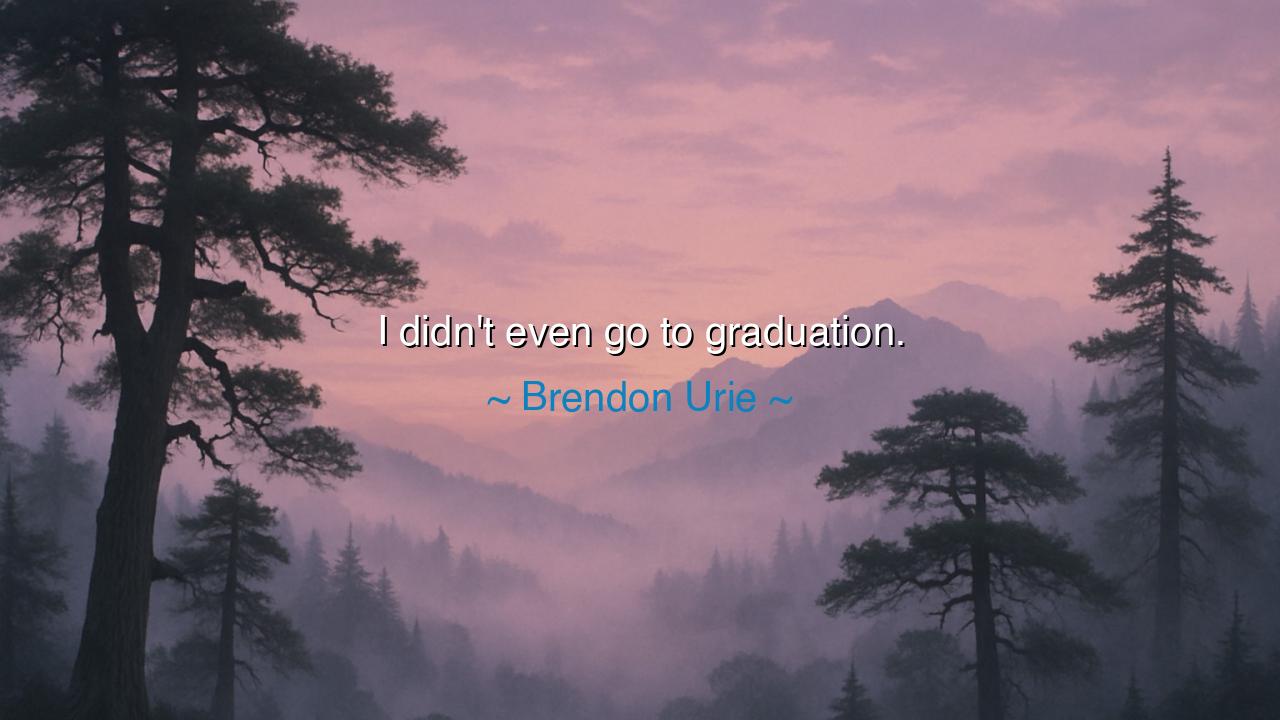
I didn't even go to graduation.






Hear, O seeker of meaning, the stark yet powerful words of Brendon Urie, the voice of defiance and destiny: “I didn’t even go to graduation.” Though brief, this sentence strikes like a bell through the fog of convention. It is not merely a confession of absence — it is a declaration of divergence, a testament to the courage of walking one’s own path. In a world that prizes ceremony and the validation of others, Urie’s words echo the eternal call of those who dare to live by a different rhythm.
The meaning of this quote lies not in rebellion for rebellion’s sake, but in the sacred act of choosing authenticity over expectation. For the graduation ceremony — that ancient rite of passage marking the end of youth’s tutelage — symbolizes the approval of society, the blessing of authority upon one’s readiness to enter the world. To attend it is to accept the world’s applause; to skip it, as Brendon Urie did, is to say, “My journey has already begun.” His absence was not ignorance of tradition, but the quiet roar of a soul already in motion. He did not need a ceremony to validate his becoming; he was already living it.
The origin of this moment rests within Urie’s own story — a young man from Nevada, restless, creative, possessed by the rhythm of music that would one day shape his destiny. While his peers prepared for the solemn pomp of graduation, he had already chosen the uncertain path of art, risk, and self-expression. To many, his choice may have seemed reckless. Yet within that decision lived the essence of every great creator: the refusal to wait for permission to begin. Where others sought closure, he sought creation. And in doing so, he joined the long lineage of those who turned away from convention to forge something eternal.
Consider, O listener, the story of Leonardo da Vinci, who as a youth apprenticed under Verrocchio, learning the disciplines of painting and sculpture. When Leonardo’s work surpassed that of his master, Verrocchio laid down his brush and declared that the pupil had become greater than the teacher. There was no diploma, no ceremony — only the silent recognition that mastery cannot always be measured by ceremony. Like Leonardo, Urie too began his journey not by waiting to be crowned, but by stepping into the world with the untested fire of his own genius. The message is clear: greatness rarely waits for applause before it begins its work.
In Urie’s words we find not contempt for education, but liberation from the need for validation. For some, the graduation stage is the culmination of effort and the symbol of pride — and rightly so. But for others, the true graduation occurs in the heart, in the moment they decide to live their truth, even when it leads them away from the expected path. Such souls measure achievement not by ceremony, but by creation — not by recognition, but by the courage to begin without it.
There is, too, a deep melancholy in these words, a whisper of sacrifice. To step away from the world’s rituals is to step into solitude. The one who walks their own way must face doubt, misunderstanding, even rejection. But so too did every trailblazer before him — the prophets, the artists, the dreamers — those who left the feast of the familiar to seek the unknown. Urie’s absence from graduation becomes, therefore, a metaphor for that moment in every life when we must choose between the safe applause of others and the dangerous beauty of becoming ourselves.
Let this, then, be your lesson, O traveler of the mind: the ceremony does not make the soul. The scroll does not grant you worth. Your true graduation comes not when others declare you ready, but when you declare yourself willing — willing to try, to fail, to rise again. If your path leads you away from the expected halls and into uncharted fields, do not fear. The world has always been changed by those who did not wait to be invited to the stage.
So walk boldly, as Brendon Urie did — not in arrogance, but in faith. Whether your graduation is marked by applause or silence, by ritual or by rebellion, know this: your worth is not written in ceremony, but in courage. Begin your journey now, wherever you stand, for life itself is the only stage upon which true commencement takes place. And when the world asks where you were on the day of your graduation, you may answer, with quiet strength, “I was already becoming who I was meant to be.”






AAdministratorAdministrator
Welcome, honored guests. Please leave a comment, we will respond soon